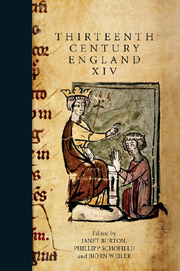Book contents
- Frontmatter
- Contents
- List of Figures and Tables
- Preface
- List of Contributors
- List of Abbreviations
- Politics and the People in Thirteenth-Century England
- Peasants, Litigation and Agency in Medieval England: the Development of Law in Manorial Courts in the late Thirteenth and Early Fourteenth Centuries
- Medieval Accounting Memoranda from Norwich Cathedral Priory
- The Seals of London's Governing Elite in the Thirteenth Century
- The Marriages of the English Earls in the Thirteenth Century: a Social Perspective
- Monks and Politics in Thirteenth-Century Wales and Catalonia
- Lope Fernández, Bishop of Morocco: His Diplomatic Role in the Planning of an Anglo-Castilian Crusade into Northern Africa
- On Kingship and Tyranny: Grosseteste's Memorandum and its Place in the Baronial Reform Movement
- St Edmund of Canterbury and Henry III in the Shadow of Thomas Becket
- Matthew Paris and the Royal Christmas: Ritualised Communication in Text and Practice
- Thomas of Lancaster in the Vita Edwardi Secundi: a Study in Disillusionment
- John and Henry III in the Anglo-Norman Prose Brut
- Genealogiae orbiculatae: Matthew Paris and the Invention of Visual Abstracts of English History
- The Genealogical Chronicles of Matthew Paris: Edition
Preface
Published online by Cambridge University Press: 05 May 2013
- Frontmatter
- Contents
- List of Figures and Tables
- Preface
- List of Contributors
- List of Abbreviations
- Politics and the People in Thirteenth-Century England
- Peasants, Litigation and Agency in Medieval England: the Development of Law in Manorial Courts in the late Thirteenth and Early Fourteenth Centuries
- Medieval Accounting Memoranda from Norwich Cathedral Priory
- The Seals of London's Governing Elite in the Thirteenth Century
- The Marriages of the English Earls in the Thirteenth Century: a Social Perspective
- Monks and Politics in Thirteenth-Century Wales and Catalonia
- Lope Fernández, Bishop of Morocco: His Diplomatic Role in the Planning of an Anglo-Castilian Crusade into Northern Africa
- On Kingship and Tyranny: Grosseteste's Memorandum and its Place in the Baronial Reform Movement
- St Edmund of Canterbury and Henry III in the Shadow of Thomas Becket
- Matthew Paris and the Royal Christmas: Ritualised Communication in Text and Practice
- Thomas of Lancaster in the Vita Edwardi Secundi: a Study in Disillusionment
- John and Henry III in the Anglo-Norman Prose Brut
- Genealogiae orbiculatae: Matthew Paris and the Invention of Visual Abstracts of English History
- The Genealogical Chronicles of Matthew Paris: Edition
Summary
The 2011 conference was generously supported by the Royal Historical Society, the Institute of Medieval and Early Modern Studies at Aberystwyth and Bangor, the Department of History and Welsh History at Aberystwyth University, and the Lampeter campus of the University of Wales Trinity Saint David. We would like to thank sponsors, speakers and participants for having made the conference a fruitful and – we hope – enjoyable experience.
While there was no set theme, the papers here presented can be grouped into a series of overlapping clusters: participation in power; social identity; the intellectual and cultural representation of politics; and uses of the past. John Maddicott draws attention to the variety of venues available to those not part of the traditional elites to participate in and respond to the affairs of the realm. Attention is paid to the kind of news that circulated among non-elites, but also the localities where such news was heard, disseminated, and debated, and why these debates mattered. Phillipp Schofield tackles the shifting role of peasants in manorial court litigation, pointing out that they were increasingly transformed from users to consumers of the law. That is, while land litigation remained often stable in its procedures, inter-personal litigation allowed peasants to establish the court as a locus of peasant legal, social and economic agency. Harmony Dewez, John McEwan, Jörg Peltzer, Karen Stöber, and Olga Méndez González explore manifestations and instruments of social identity.
- Type
- Chapter
- Information
- Thirteenth Century England XIVProceedings of the Aberystwyth and Lampeter Conference, 2011, pp. ix - xPublisher: Boydell & BrewerPrint publication year: 2013



